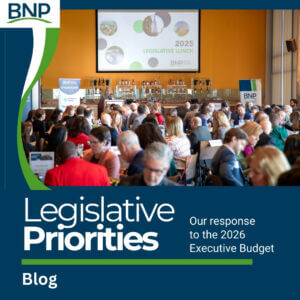11.15.21 Advocacy Alert: BIDEN SIGNS INFRASTRUCTURE INVESTMENT BILL
Blog Categories
November 15, 2021
Historic Bill Signed
On November 15th, President Joe Biden signed the bipartisan Infrastructure Investment and Jobs Act into law.
The BNP advocated for this important legislation, which will make critical investments in our roads, bridges, water infrastructure, electric grid, and broadband while allowing our community to pursue landmark projects. Importantly, the bill makes these investments without raising taxes.
This legislation will provide numerous benefits to our regional and national economies. Learn more about this bill and the BNP’s efforts here.
The BNP thanks Sen. Chuck Schumer, Sen. Kirsten Gillibrand, Rep. Tom Reed, and Rep. Brian Higgins for their support of this bipartisan legislation.
As we move into 2022, the BNP will be focused on advocating for an efficient, effective distribution of funds that meets our region’s needs and makes transformational projects possible.
What About the Reconciliation Bill?
The President’s decision to sign the bill today is an interesting twist in the ongoing negotiations on the “Build Back Better” reconciliation bill, the Democrats’ $3.5 trillion social spending package.
The reconciliation bill and the bipartisan infrastructure bill, to this point, had been discussed in tandem. Speaker Pelosi attempted to link the bills in order to secure (a) progressive support for the bipartisan infrastructure bill and (b) moderate Democrat support for the reconciliation bill. Her thinking was that moderates may hold their noses and vote for reconciliation if they knew it would result in them getting their way on infrastructure.
However, the President’s signing of the infrastructure bill may change their calculus. With the moderates’ desired bill already signed into law, Biden and Pelosi lose leverage to force their hand on the reconciliation vote.
Since House Republicans are expected to oppose the reconciliation bill in unison, four defections from the 221-member Democratic caucus could sink the bill.
Many moderate Democrats have already expressed concern about the cost of the reconciliation bill, telling the Speaker in a letter last week that they will not consider voting for the bill until the Congressional Budget Office scores the legislation.
Still, at today's bill signing, Speaker Pelosi appeared optimistic that the reconciliation bill would eventually pass.
The reconciliation bill has been heavily opposed by the U.S. Chamber of Commerce, who notes that the bill includes massive tax increases and some problematic policy changes.
The BNP will keep you informed of any updates regarding the reconciliation bill.
Related Posts
Legislative priorities: BNP’s reaction to the Executive Budget
On February 14, we set the stage for critical discussions about the future of New York State’s economy by convening regional business leaders and policymakers, along with BNP members, at the 1970 Club in KeyBank Center for our Legislative Luncheon.
2025 Advocacy Agenda: Shaping the future
On Jan 9, our signature Government Affairs event unveiled the strategies and priorities that will guide our work this year with policymakers.
Expert panel talks collaboration as key to tech hub future
Buffalo Niagara Partnership President & CEO Dottie Gallagher was a recent guest on M&T Bank’s CommunityLIVE to discuss the tech hub and what it means for the region moving forward.
BNP hosts NYS Assembly committee roundtable on the future of tech
The Buffalo Niagara Partnership, TechBuffalo and Microsoft hosted the New York State Assembly Science & Technology Committee for a roundtable discussion focused on equity, workforce and skilling for the tech future.




